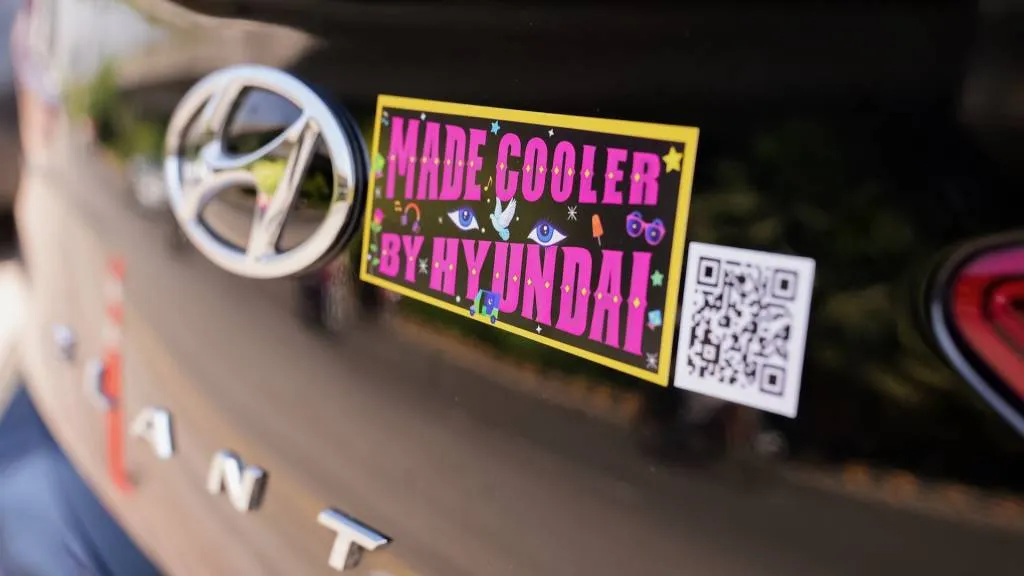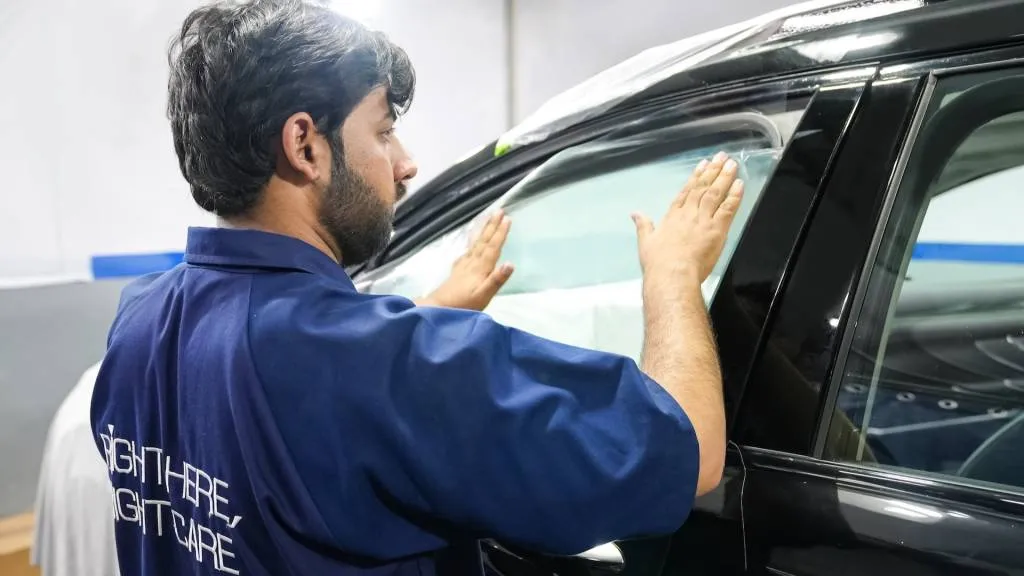Hyundai has developed a window tint that the automaker claims can help keep interiors cooler—and thus save energy normally used for air conditioning.
Unlike materials that simply darken windows, and reduce outward visibility, Hyundai states in a press release that its Nano Cooling Film reduces interior temperatures by specifically blocking external heat and radiating internal heat toward the outside of the vehicle.
The timing film is comprised of three layers. An outer layer radiates heat at mid-infrared wavelengths, while two inner layers reflect incoming heat at near-infrared wavelengths, according to Hyundai.
Hyundai Nano Cooling Film window tint tested in Lahore, Pakistan
Nano Cooling Film was first shown in 2023, but Hyundai recently put it to the test on 70 customer cars in Lahore, Pakistan. Hyundai said it selected Lahore because attaching tinting film to vehicle windows is prohibited by local regulations. And with summer temperatures exceeding 122 degrees Fahrenheit, it’s as good a place as any to test interior-cooling tech.
Hyundai claims interior temperatures in the test vehicles dropped by 50 degrees Fahrenheit, while still complying with regulations. That aligns with Hyundai’s own laboratory tests, which showed temperature decreases near the driver’s head of 51.7 degrees Fahrenheit compared to conventional tinting and 54.1 degrees compared to the same vehicle without tinted windows at all.
Hyundai isn’t discussing commercialization plans, but noted that Nano Cooling Film can be applied in tandem with conventional tint film where regulations allow. So it could be useful in hotter parts of the U.S.

Hyundai Nano Cooling Film window tint tested in Lahore, Pakistan
In addition to high-tech tinting, there have also been various efforts attempting to combine tinted windows and solar cells. Although the spray-on solar cells that had been touted years ago as a possibility haven’t yet come to fruition, some hybrids and EVs now do have roof arrangements that partly block the sun and generate some energy.
EVs fundamentally don’t sacrifice as much efficiency cooling the cabin in hot weather than they do heating the cabin an equivalent amount. And it comes down to physics, and heat pumps can help with warming vehicle cabins by moving heat rather than creating it.

lasuna order online – cost himcolin himcolin sale
besifloxacin buy online – order besifloxacin online cheap buy sildamax generic
order neurontin 100mg online – purchase azulfidine online cheap cheap azulfidine 500mg
order probalan online – order generic tegretol tegretol over the counter
cost celecoxib 200mg – purchase celecoxib generic order indocin for sale
buy generic colospa 135mg – cost mebeverine 135mg order pletal 100mg sale
cambia uk – aspirin 75 mg usa aspirin 75mg brand
buy rumalaya without a prescription – rumalaya order order endep without prescription
pyridostigmine 60mg price – azathioprine 25mg brand azathioprine 50mg price
purchase voveran generic – isosorbide 40mg cheap nimotop canada
lioresal for sale online – buy baclofen 25mg pills buy generic piroxicam online
buy periactin generic – tizanidine sale cost zanaflex
mobic 7.5mg usa – toradol 10mg for sale toradol buy online
buy omnicef pills – buy generic omnicef over the counter buy clindamycin without prescription
artane usa – buy trihexyphenidyl generic emulgel buy online
how to get accutane without a prescription – order avlosulfon generic deltasone 20mg ca
buy prednisone 20mg online cheap – order prednisolone 5mg generic buy zovirax sale
buy permethrin generic – purchase benzoyl peroxide cream buy generic tretinoin online
order betamethasone 20gm for sale – cost betamethasone buy benoquin cream for sale
metronidazole us – order cenforce 100mg pill purchase cenforce pills
augmentin 1000mg canada – buy generic clavulanate buy generic synthroid
cleocin 150mg price – buy cheap cleocin order indocin for sale
hyzaar usa – order keflex 125mg generic order cephalexin 125mg
order generic eurax – how to get aczone without a prescription aczone where to buy
buy generic provigil – order provigil 200mg order generic meloset 3 mg
bupropion 150 mg us – ayurslim generic shuddha guggulu pills
order xeloda 500mg for sale – mefenamic acid medication buy danazol 100 mg without prescription
prometrium sale – order prometrium online how to buy fertomid
buy norethindrone for sale – buy aygestin generic yasmin cost
г‚·гѓ«гѓ‡гѓЉгѓ•г‚Јгѓ« йЈІгЃїж–№ – г‚·г‚ўгѓЄг‚№йЂљиІ©гЃ§иІ·гЃ€гЃѕгЃ™гЃ‹ г‚·г‚ўгѓЄг‚№гЃ®иіје…Ґ
гѓ—гѓ¬гѓ‰гѓ‹гѓі жµ·е¤–йЂљиІ© – гѓ—гѓ¬гѓ‰гѓ‹гѓі е‰ЇдЅњз”Ё г‚ўг‚гѓҐгѓ†г‚¤гѓійЊ 20 mg еј·гЃ•
eriacta urgent – eriacta mass forzest argument
buy generic crixivan – crixivan uk emulgel where to buy
valif whisper – valif online blank sinemet pills
how to buy modafinil – buy provigil pills buy combivir pills for sale
order promethazine 25mg generic – buy promethazine generic lincomycin sale
ivermectin 6 mg pills – candesartan 16mg sale tegretol us
deltasone 5mg sale – nateglinide tablet captopril 25mg brand
order amoxil online – valsartan ca cheap ipratropium 100mcg
zithromax 250mg price – order azithromycin pill order bystolic 5mg online cheap
omnacortil pill – omnacortil 5mg without prescription buy prometrium without a prescription
augmentin 1000mg oral – amoxiclav for sale cymbalta 20mg over the counter
vibra-tabs drug – order glipizide 10mg glucotrol 10mg uk